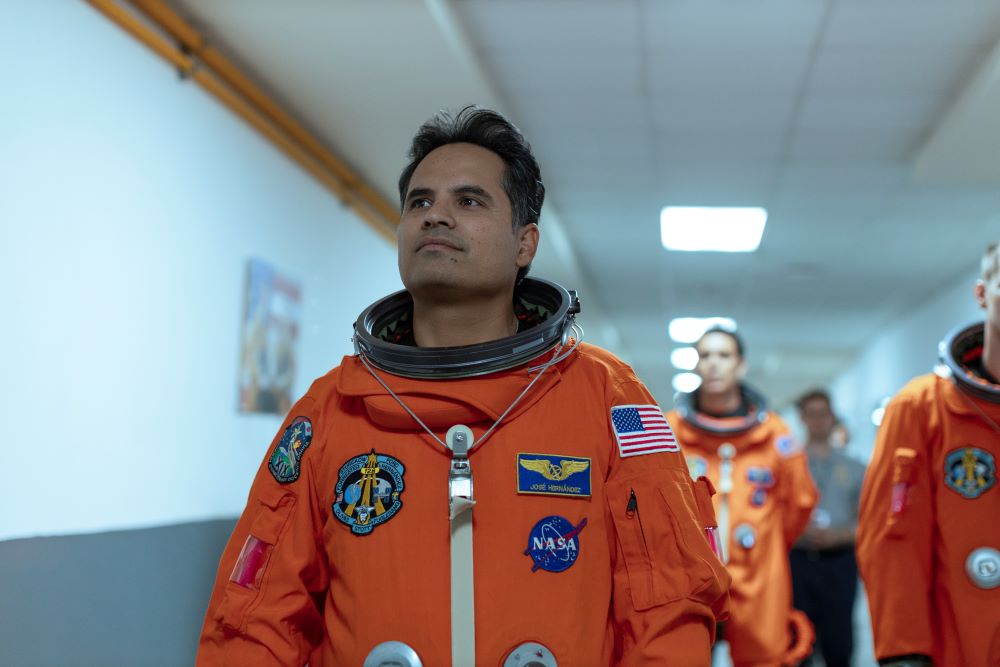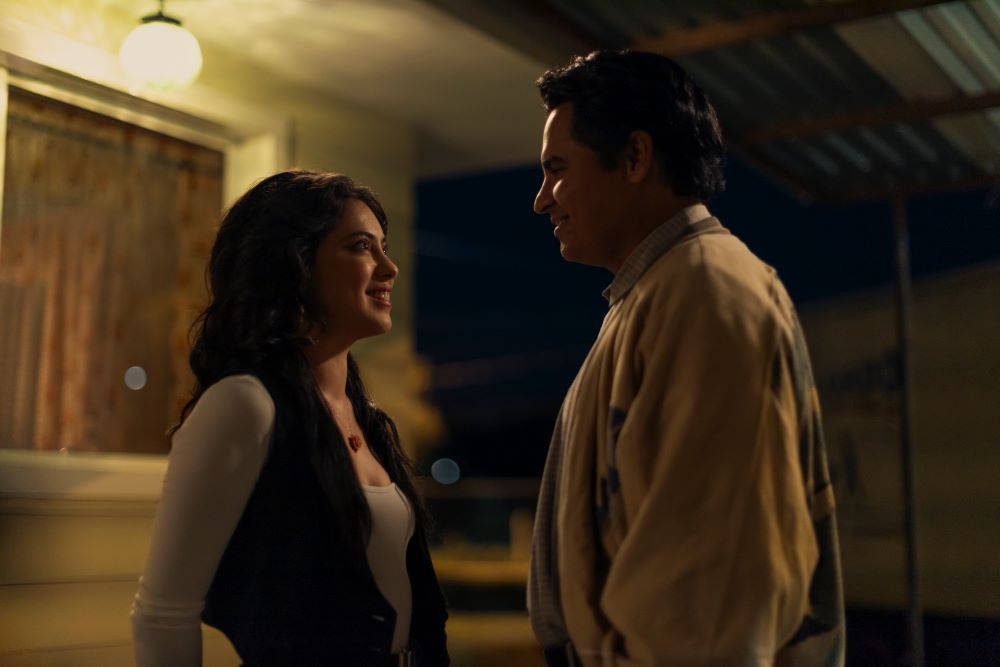
Michael Peña portrays José Hernández in "A Million Miles Away," Amazon Studios’ new biopic about the son of migrant farmers who became one of the few Americans chosen to participate in NASA’s space program. (Amazon Studios)
José Hernández's father has a recipe for success. First, find a goal. Second, determine how far you have to go to reach said goal. Third, decide how you're going to get there. Fourth, if you don't know how, learn. And fifth, when you think you've made it, be prepared to try even harder.
This may sound like something a motivational speaker made up, or an earnest take on the American dream. But it's solemn advice coming from a man who spent most of his life as a migrant farmworker in the fields of California. The young Hernández takes his father's words to heart, and after watching the 1969 Apollo 11 moon landing on TV, Hernández chooses his goal: He will grow up to be an astronaut.
While most children who want to be astronauts grow up and out of that dream, Hernández clings to it long into adulthood. "What are stars for?" he asks his mother and, when she doesn’t have an answer, his favorite elementary school teacher. His teacher responds, "You know what, I think you're going to be one of those people who can actually come up with an answer to that kind of question."
In "A Million Miles Away," Amazon Studios' new biopic about real-life astronaut José Hernández, we never get an answer to that question about stars, nor do we ever really understand why Hernández is so bent on making his way to outer space. What we do get is a chance to watch Hernández go from a hard but loving childhood working with his family in the fields to becoming one of the few Americans chosen to participate in NASA's space program.

Rosa Salazar and Michael Peña star as a married couple in "A Million Miles Away," based on José Hernández's 2012 memoir. (Amazon Studios)
The movie, based on his 2012 memoir, Reaching for the Stars: The Inspiring Story of a Migrant Farmworker Turned Astronaut, is predictable, and there are cheesy moments that will likely turn away cinephiles. Despite its shortcomings, though, there is something deeply inspiring about Hernández's story that manages to shine through. In a world that is often cynical, where many of us have lost hope in the power of the individual to achieve through hard work and tenacity, Hernández's story stands as a beacon of what remains possible if one does not give up on a dream.
Despite its heroic ending — this isn't a spoiler; we know from the start Hernández makes it to space — perhaps the best aspect of the film is its portrayal of the ordinary life of Mexican migrant farmworkers and their children. Hernández, played by Michael Peña, wants to be an astronaut, but most of his life is spent doing everyday things.
He turns down the enchiladas his mother makes for him because he doesn’t want to be "the enchilada guy" among his white colleagues. He suffers the (at times racist) indignities of starting at the bottom rung as an engineer in the Lawrence Livermore National Laboratory, making copies instead of working on the lasers that are supposed to save the U.S. from Soviet nuclear warheads. He marries, buys a house in the suburbs, becomes dad to five kids. He buys diapers. He throws birthday parties complete with piñatas and colorfully decorated sheet cakes. He and his wife, played by Rosa Salazar, argue. They make up. On occasion, they help their families pick produce in the fields. All the while, Hernández sends application after application to the space program, and time and again he is rejected.
Director Alejandra Márquez Abella missed several opportunities to deepen the film. For one, a chance to situate Hernández's dream of participating in the space program within a greater historical context. After the moon landing, the space program has struggled to retain funding and has sometimes been deemed unnecessary. But the film offers no serious examination of the national security reasons for space exploration, nor the human drive to reach the next frontier. Nor does the film explore the role Hernández's Catholiciscism plays in his dream of getting to outer space.

Juan Pablo Monterrubion portrays a young José Hernández in "A Million Miles Away," based on the memoir by Hernández, who as a child worked with his family as a migrant farmer and later became an astronaut. (Amazon Studios)
We get little glimpses of this faith: a child's baptism, a precious pendant of Mary the Mother of Jesus Hernández gets from his beloved cousin, a vigil with candles and a rosary on display. But given the entire film is directed toward getting into the celestial heavens, there is, surprisingly, no talk of Hernández's belief in, say, a creator, no tension between his ambition and the call of Christianity to die to oneself.
Hernández loses friends when the space shuttle Columbia explodes in 2003, just minutes before it was to land on earth. He knows he is risking his life when he goes up on the next shuttle, the Discovery. Why go at all? Is he laying down his life for his country? Or is he putting his life at risk to chase a vainglorious adventure? There are many good reasons to pursue a dream. Unfortunately, every time someone asks Hernández why he wants to go to outer space, he answers, "I don’t know."
Advertisement
Nonetheless, it's impossible not to be inspired by Hernández, as well as the family who supports him so thoroughly. After half a dozen rejections, and with his wife's encouragement, he begins to train in earnest. He becomes a pilot, obtains his scuba diving certification, runs the San Francisco marathon, travels to Siberia, receives a master's in electrical engineering — and more. All the while, he remains a steadfast husband and father, often surrounded in the embrace of his loved ones.
Sacrifice is threaded throughout the film: the sacrifices Hernández's parents make for him to attend college; the sacrifices his wife makes for him to pursue the space program; the physical, financial and emotional sacrifices Hernández himself makes to reach his dream.
"Tenacity is a superpower," says one of his NASA trainers. This could be the motto of the entire film. Hernández's life serves as a reminder of what's possible through grit, determination and the support of family. In the end, the film offers a better take on the American dream: not the tale of the autonomous individual, but rather, the tale of the determined individual striving within the love of his community.







